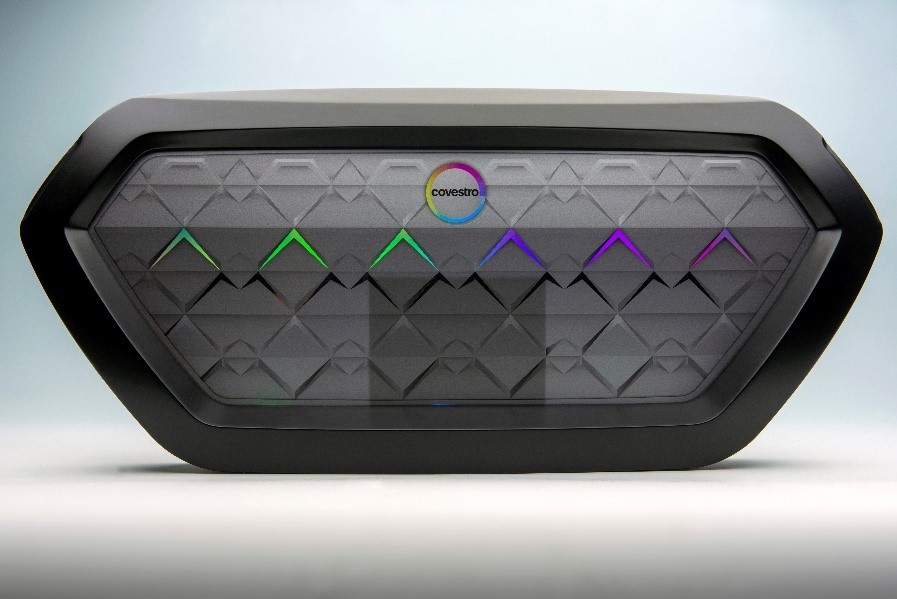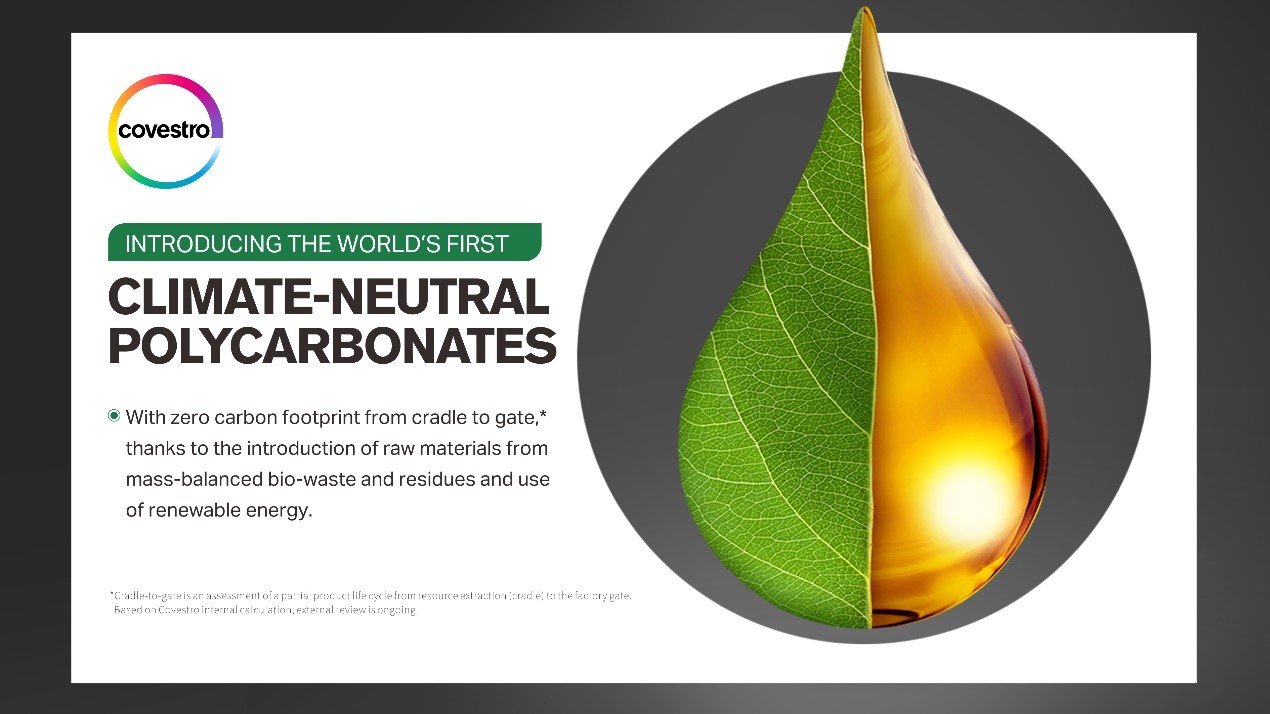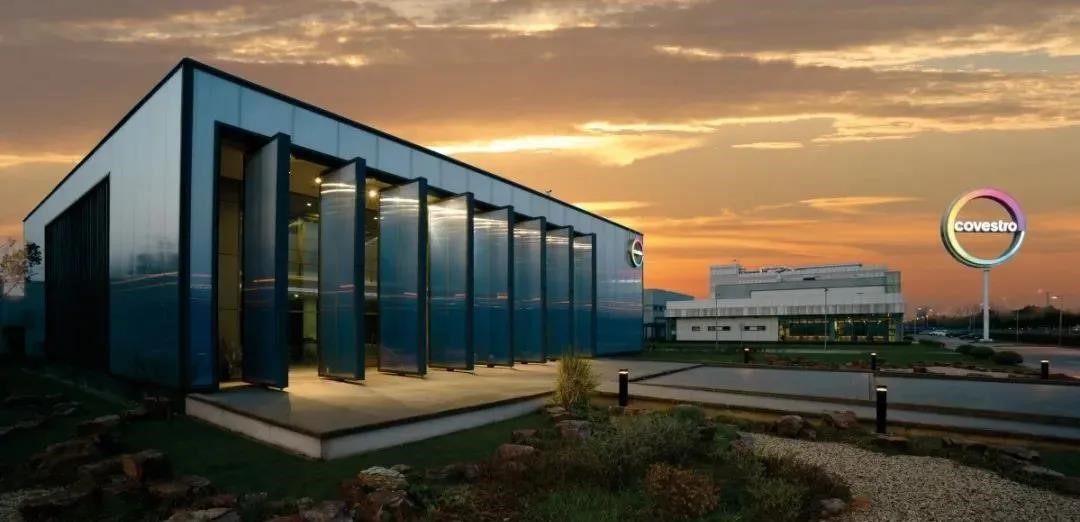Masters of the new racetrack: How Covestro is helping to reshape the automobile industry
Whether it is the encouraging policies successively launched by the government, the future-oriented strategic adjustment of traditional automobile enterprises, or the "new forces" of automobile manufacturing that are constantly entering the market, the automobile industry is experiencing unprecedented change and development, which is propelling China's automobile industry into a new era of intelligent electric power. At the Shanghai Auto Show -- the first grade A international auto show in 2021 -- intelligent electrification is once again firmly occupying the center position. With the Shanghai Auto Show's theme of "Embracing Change," various automobile enterprises have put their blockbuster vehicles on show with a focus on aspects such as "intelligent" and "electric," and suppliers have introduced their cutting-edge technological achievements.
Intelligence and electrification is bringing new energy into the global car market and conveying new vitality in doing so. However, the role and function of the interior and exterior trims of future automobiles are being redefined. Along with these trends and changes, more requirements for materials have appeared, such as lightweight and sustainable properties. Covestro, as a high-end material supplier, has also been actively exploring the applications of materials in the automobile industry in recent years.
Covestro moving at full speed under new trends
“The global mobility industry is in turmoil, and the value chain has to reinvent itself.” Jochen Hardt, the vice president of global marketing for Covestro's polycarbonate business, said, “the architecture of cars will change in the medium term, this will mean a move away from combustion engine powertrains to electric ones – from various types of hybrid to hydrogen and full electric vehicles. At the same time, we will see completely new entrants from different industries moving into automotive, and people from classic powertrain suppliers struggling, because their core business is disrupted. This disruption is coinciding with the second big trend: connectivity, whereby cars will become connected and part of wider and integrated ecosystems. One example of this is connectivity: users in future vehicles will use the in-car systems to communicate both externally and internally, and the car itself will be an interconnected part of a communication web within the wider traffic system. This requires integration of interior and exterior applications including sensor systems, LiDAR systems, radar and camera systems.”
With this being the case, Covestro's polycarbonates and its blends have opened up new application prospects. These are not only suitable for batteries and charging stations, but can also be used to skillfully integrate vehicle-mounted sensor systems, including LiDAR, radar and camera systems, which will help seamlessly realize the technology needed for automotive communication networks.
Terence Yau, the vice president of Covestro's China Polycarbonates business unit, displayed Covestro's new material solutions for lightweight battery packs used in electric vehicles, and also showed the company's material solutions for seamlessly integrated front grilles at the Shanghai Auto Show.
Among these, the material solutions for the upper shells of full-size, recyclable thermoplastic battery packs are still in the process of joint development. This product is based on a polycarbonate + long glass fiber (PC+_LFTD) production line blending and molding process, and can be freely designed and easily recycled. Furthermore, a flame retardant coating with excellent adhesion is used to make power batteries for new energy vehicles that are more lightweight, and also to help these batteries satisfy better fire safety requirements, such as the GB 38031-2020 standard (Safety Requirements of Batteries for Electric Vehicles). Optical-grade polycarbonates, thin film and FIM technology is used as a solution for creating seamlessly integrated front grilles. These materials not only exhibit novel stereoscopic surface effects, but also hide LiDAR, camera and other advanced sensors behind the front grille of vehicles without affecting their long-range detection functions.

Seamlessly integrated front grille prototype, photo source: Covestro
The essence of vehicle electrification is to reduce carbon emissions while replacing non-renewable resources. With regard to this, Covestro launched the global vision of “we will be fully circular” in 2020, which focuses on the transition to a Circular Economy. During the Shanghai Auto Show, Covestro also set “Smart Mobility for a Sustainable Future” as its main theme.
“The automotive industry is already starting to adapt to our world of finite resources. The rise of the electric vehicle and the plug-in hybrid is an indicator, but this transition has also more far-reaching consequences. It means a fundamental rethink in how cars are manufactured, used and finally recycled, moving from an extractive model to a circular one. In this closed loop approach, end-of-life plastics are viewed as a valuable raw material to recycle, rather than something to be disposed of,” says Jochen Hardt. “Covestro is focused on using alternative raw materials, developing innovative recycling technologies, and establishing new, value-creating collaborations to help the automotive industry in its sustainability transformation.” At present, Covestro is studying new material processes and designs for interior and exterior trim components, to find more ways to achieve the company's Circular Economy goal.

The upper shells of a full-size, recyclable electric vehicle battery pack, photo source: Covestro
Moreover, Covestro is also committed to achieving the traceability of plastics through blockchain technology. Covestro has cooperated with Porsche, Circularise (a blockchain startup company) and multiple suppliers to create digital twin circuits through the value chain, and to track the plastics used in Porsche cars along with their carbon footprint.
As part of its sustainable product solutions, Covestro has previously introduced polycarbonates containing renewable raw materials that are certified by ISCC PLUS to the market. In the last CHINAPLAS, Covestro announced that the world's first climate-neutral polycarbonate has been researched and developed. It is currently set to deliver the first batch of products at Covestro's European plant in 2021, to be followed by sites in other regions including China, according to market demand.

The world's first climate-neutral polycarbonate, photo source: Covestro
The Makrolon® polycarbonate product uses alternative raw materials (biological waste and residue distributed based on a mass balance method) and renewable energy to achieve climate neutrality at the "cradle-to-gate" stage of its life cycle. These products have the same quality and performance as similar fossil-based products, and can be directly applied to existing production processes.
Note*: The mass balance method is a kind of supervised chain method that tracks materials through the value chain, which can allow renewable raw materials to be distributed to their designated final products.
“This is a major step towards our vision to become fully circular while better supporting our customers to reach their sustainability goals. This is a milestone in our mission,” says Jochen Hardt. “We aim to help many industries including electrical, electronics and appliances, mobility, and healthcare meet their challenges by providing products and solutions that provide excellent performance, cost efficiencies and sustainability.”
With regard to this, Terence Yau also expressed that Covestro has integrated the principles of the Circular Economy and continuous advancement into all business development, which is a great competitive advantage for it to become a strong market leader in the Chinese market. In the future, Covestro will continuously strengthen its advantages through business and technology.
Covestro challenges new trends based on the local market
Under the COVID-19 pandemic, the strong resilience and broad prospects exhibited by China's automobile market have once again attracted a collective "bet" from all parties. Under the new wave of industry change, China, as the largest single market for passenger vehicles and electric vehicles, has also become the "forefront" of the global automotive industry reform.
Until now, Covestro’s investment in China has totaled over 3.8 billion euros. Statistically, the Chinese market has also become the largest single market for Covestro. As for Covestro's future position in the Chinese automobile market, Jochen Hardt stated, “The automotive market in China showed a great development over the past decade. The dynamic competition among global and Chinese players accelerates the overall market development in terms of vehicle design, manufacturing and technological capabilities. We observe an openness in the Chinese industry to test completely new concepts, designs and technologies in new product launches, with a significantly reduced time to market. Therefore, China is one of the global key mobility markets for Covestro.”
Covestro is building a localized scientific research team based in China. In 2001, the Covestro Polymer Research and Development Center was established in Shanghai, and gradually developed into a center of innovation in the Asia-Pacific region, providing high-quality services to customers in the Asia-Pacific region and even all over the world which focuses on providing polycarbonate, polyurethane, coatings, films, composite materials and other material solutions for customers in China and the Asia-Pacific region.

Covestro Polymer Research and Development Center, photo source: Covestro
In February of this year, Covestro also announced that it plans to build a new polyurethane dispersion (PUD) production facility at its integrated site in Shanghai, and a new polyester resin production line at the Shanghai site to provide raw materials for PUD. The goal of this plan is to satisfy the growing demand for environmentally-friendly coatings and adhesives in the Asia-Pacific region. The new plant is expected to be completed in 2024.
In the face of new trends and changes in the automobile industry, Terence Yau said that Covestro’s core competitive advantage lies in the fact that we are not only the supplier of materials. Covestro can provide abundant experience in materials, processing and design for automobile manufacturers and component manufacturers during the development and mass production of new parts, which helps innovative customers avoid detours and complete component and project development faster.
At the same time, Covestro also noted that automobile manufacturers not only seek performance, but also hope to obtain sustainable solutions. Users' requirements for interior air and interior trim environmental protection are constantly increasing, and the R&D focus of automobile parts suppliers is also shifting to more intuitive in-car riding experiences, and user perception and touch.
Covestro launched a complete set of waterborne automotive interior trim adhesive solutions based on waterborne PP bottom coating products, which can apply to low surface energy materials, proving its excellent bonding performance. Covestro’s Dispercoll®U waterborne adhesive solution can satisfy the environmental requirements of vehicle interior trims, and further reduces the amount of volatile organic compounds and odors in cars. At the same time, it satisfies higher heat resistance and weathering resistance requirements, and exhibits an excellent adhesive performance in harsh environments. This in turn provides more flexible design space for future automotive interior trim designs, and helps automobile manufacturers to produce green vehicles that are environmentally friendly, low-carbon, comfortable and durable.
It is known that polyurethane is considered to be one of the most environmentally friendly materials in terms of reducing emissions of volatile organic compounds (VOCs). Covestro analyzed the six main sources of in-car odors to significantly enhance emission levels of in-car odors through the selection of polyurethane raw materials, quality controls and product formulations.
At the Auto Show, Covestro also displayed the results of its in-depth cooperation with the GAC R&D Center -- Maezio® continuous fiber-reinforced thermoplastic composite, which was used for the front seat backplate of the electric concept vehicle ENO.146.
It is said that the material can be up to 50% lighter compared to traditional metal materials, while the production processes can be simplified thanks to integral molding. Moreover, as a thermoplastic composite material, it can be recycled after its useful lifespan ends, and reheated to form new parts after being mechanically chopped, which perfectly suits the continuous advancement concept of prototype vehicles.
 Maezio® continuous fiber-reinforced thermoplastic composite photo source: Covestro
Maezio® continuous fiber-reinforced thermoplastic composite photo source: Covestro
“Covestro has [as Bayer] been building concept cars and demonstrators with industry partners since 1967. The purpose here is to really show what is possible, with technology and materials for the near future and also solutions that require more imagination but are not completely unrealistic,” Jochen Hardt said. “Our role is to meet these challenges with solutions, in the form of new material technologies, developed in partnership with our customers. This is not just about the materials we produce; it’s about context and understanding engineering, features, electronics and design, as well as the impact this can have on mobility trends of the future.”
Covestro is actively transforming accumulated potential energy into kinetic energy to create a new engine for enterprise development. In this regard, we also have reason to believe that Covestro will stand out among the torrent and give rise to the "Covestro Speed."
Gasgoo not only offers timely news and profound insight about China auto industry, but also help with business connection and expansion for suppliers and purchasers via multiple channels and methods. Buyer service:buyer-support@gasgoo.comSeller Service:seller-support@gasgoo.com







